| SHADOWS ON THE WALL | REVIEWS | NEWS | FESTIVAL | AWARDS | Q&A | ABOUT | TALKBACK | |||||
 Shadows off the beaten path Shadows off the beaten pathIndies, foreigns, docs and shorts...
On this page:
AVIVA |
FAREWELL AMOR |
MINARI
| |||||
| See also: SHADOWS FILM FESTIVAL | Last update 23.Dec.20 | |||||
|
Aviva Review by Rich Cline | 
| |||||
 dir-scr Boaz Yakin prd Carlos Zozaya, Boaz Yakin, Bobbi Jene Smith with Zina Zinchenko, Bobbi Jene Smith, Tyler Phillips, Or Schraiber, Omri Drumlevich, Jonathan Mastrojohn, Evan Copeland, Joaquim de Santana, Yiannis Logothetis, Daniel Staaf, Annie Rigney, Roman Malenda release US 18.Dec.20 20/US 1h56 Is it streaming? |
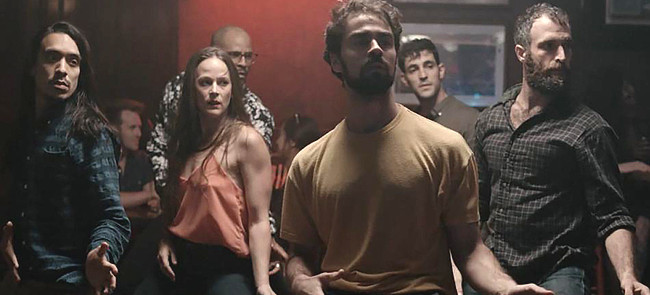 Postmodern voiceover breaks the barriers between the screen and the audience, allowing this surreal film to express its story through dance and emotion. With its flickering genders, a variety of settings and offbeat narrative, the film is relentlessly surprising and somewhat bewildering. It's also involving and moving, as writer-director Boaz Yakin takes an ambitious dive into humanity. The approach is reminiscent of Terrence Malick's work, but a lot sexier. Living thousands of miles apart, Aviva (Zinchenko/Schraiber) and Eden (Smith/Phillips) are introduced by a mutual friend (Mastrojohn). As their friendship blossoms into romance, they see each other as kindred spirits, neither male nor female. Eventually, Aviva moves to New York so they can be together, which of course means that there are immigration issues that need to be sorted out. And Aviva's homesickness brings a sense of being lost. After they marry and settle down, differences arise. Then Eden moves to Los Angeles for work. Their romance certainly isn't a smooth journey. Each character is introduced with a fully nude portrait, and many of them also speak straight to camera as the story flickers around. A wide range of actors and dancers play scenes that explore life from birth onwards, honing in on the work it takes to sustain even a close relationship. Aside from the two Avivas and Edens, the kaleidoscopic approach makes it tricky to follow the many characters. Still, a loose sense of narrative emerges along the way. And it's beautifully choreographed and shot, with a remarkable depiction of physical connections. The scrambled genders echo the idea that love is simply love. The four actors playing Aviva and Eden couple in each combination, revealing aspects of sex, romance, tension, understanding and distance. Zinchenko and Schraiber play Aviva as a foreigner trying to fit into a new culture, while Smith and Phillips give Eden an easy confidence as a native New Yorker. There are also children who play the roles from time to time, as multiple variations intermingle, sometimes contending with themselves. The opening narration notes that the film features dancers acting, because it's harder to teach actors to dance. This acting inexperience does show in the dramatic scenes, which are engagingly natural but never textured. The depth comes in the dance sequences, which are gorgeously performed and filmed in terrific locations. The story drags along the way, with sections that feel repetitive or aimless even if they look great. And along the way, Yoakin recounts a universal story of romance and relationship that's viscerally moving.
| ||||
|
Farewell Amor Review by Rich Cline | 
| |||||
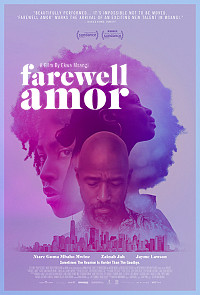 dir-scr Ekwa Msangi prd Huriyyah Muhammad, Sam Bisbee, Josh Penn, Ekwa Msangi with Ntare Guma Mbaho Mwine, Zainab Jah, Jayme Lawson, Joie Lee, Marcus Scribner, Nana Mensah, Rayshawn Richardson, Francisco Burgos, Howie Sheard, Amy Hohn, Souleymane Sy Savane, Mariam Chemmoss release US 11.Dec.20, UK 18.Dec.20 20/US Mubi 1h35 SUNDANCE FILM FEST  Is it streaming? |
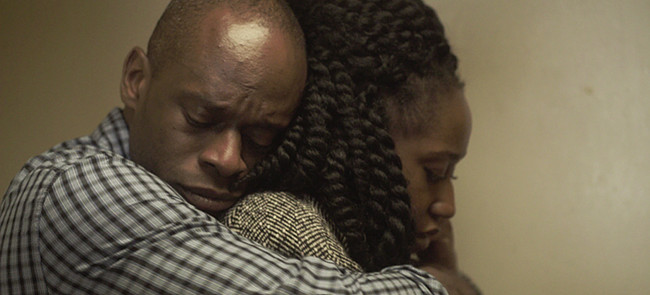 Finely observed by filmmaker Ekwa Msangi and beautifully performed by a naturalistic cast, this immigrant drama is instantly involving, pulling us into a situation that's easy to identify with. The story's structure may be rough around the edges, but it's photographed and played in a way that explores deeper meaning in each scene. This is a sensitive, intimate tale of a divided family that finds healing in its humanity. It's been 17 years since cab driver Walter (Mwine) left Angola to live in America, and now his wife Esther (Jah) and teen daughter Sylvia (Lawson) are joining him. But he lives in a tiny one-bedroom Brooklyn flat, and they don't really know each other any more. As they get reacquainted, Walter is still struggling after ending a relationship with Linda (Mensah). But he makes an effort to bring Esther into his life here. And unlike Esther, Walter understands Sylvia's need for independence. The question is whether they can ever truly find common ground again. The film's slice-of-life style explores the situation from various perspectives, circling back to see things through different eyes as each of these three people adapts to this new situation. Some of the editing is choppy and unclear, but there's continual insight that adds to the bigger picture. And there are outside relationships as well, from Linda to Sylvia's charming classmate DJ (Scribner) to Esther befriending a straight-talking neighbour (Lee). All of this feels into the connections between these three family members. Mwine has a remarkable presence, easy and likeable, revealing thoughts and feelings in everything he says. His tender approach to Esther is quietly moving, and she's played by Jah with an open-handed honesty, both in her pious religious pronouncements and an understanding approach to this new life. And as Sylvia, Lawson has a steely desire to embrace this new culture and be seen for who she is. Meanwhile, Scribner, Lee and Mensah add telling moments along the way. It's fascinating to watch Esther struggle to understand how her husband has adapted to American life. The way she over-spiritualises everything is a huge barrier between her and both Walter and Sylvia. So it's powerfully engaging as Walter discovers how music and dance can help reconnect him with both his wife and daughter. And as the plot unfolds in ways that are never simplistic, each of these three will make some startling discoveries about themselves. The key is to keep your eyes and your heart open.
| ||||
|
Minari Review by Rich Cline | 
| |||||
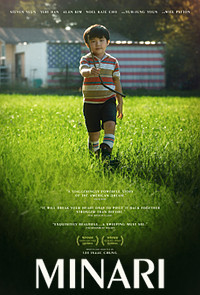 dir-scr Lee Isaac Chung prd Dede Gardner, Jeremy Kleiner, Christina Oh with Steven Yeun, Yeri Han, Alan Kim, Noel Kate Cho, Yuh-jung Youn, Will Patton, Scott Haze, Jacob Wade, James Carroll, Esther Moon, Darryl Cox, Eric Starkey release US 11.Dec.20, UK 19.Mar.21 20/US 1h55 SUNDANCE FILM FEST Is it streaming? |
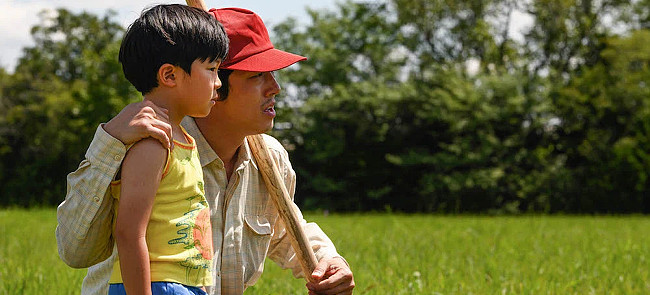 Writer-director Lee Isaac Chung tells a story about Korean immigrants in the rural US, knowingly exploring common experiences of expat families while pointedly unpicking the American Dream. Even more important is the rich, effusive portrait of normal family life, with its ups, downs, joys, compromises and challenges. After a bright start, the narrative is perhaps too deliberately downbeat for its own good. But it plays out beautifully on-screen. When Jacob (Yeun) moves his family to a farm in Arkansas, his wife Monica (Han) isn't thrilled. But their young kids David and Anne (Kim and Cho) find plenty to explore around their prefab house. Working in a chicken hatchery, Monica is annoyed that they're so far from the nearest shops, schools and hospitals. And she loses it at the first tornado warning. As a compromise, she brings her mother Soonja (Youn) to live with them. And Jacob works with nutty neighbour Paul (Patton) to plant Korean crops he can sell to the immigrant community. The characters are strikingly well-observed, with sparky personalities and distinct senses of humour. Jacob's interaction with little David is hilarious, underscored with emotion and bright energy as he teaches his son to use his mind rather than following local superstitions. Although maybe they should pay more attention to local culture. It's telling that, after living in urban California, the kids prefer to speak English. And they're also less thrilled about the strange foods Grandma brings from Korea, to Monica's delight. Yeun is excellent as Jacob, a dreamer who can't understand why his plans never go smoothly. But he perseveres with his farm and is attentive to his family, but begins to lose focus as things go wrong. Kim has the other focal role as the brightly watchful Daniel, who learns quickly. Meanwhile, Youn is the scene-stealer as the larger-than-life Grandma. She may not be able to cook, but she has a rambunctious relationship with her grandkids. Han and Cho are also superb in key roles. The title refers to water celery seeds Grandma brings from Korea and plants by the creek. There are a remarkable amount of details connected to each character in this film, each of which adds a layer of involvement. Along with the more comical elements, there are challenging story elements touching on the impact of health and religion. Jacob and Monica had a difficult life in Korea, and went to America to save themselves. But this isn't a promised land, and perhaps it's their priorities that need resetting.
| ||||

See also: SHADOWS FILM FESTIVAL © 2020 by Rich Cline, Shadows
on the Wall
HOME | REVIEWS | NEWS | FESTIVAL | AWARDS
| Q&A | ABOUT | TALKBACK | | ||||


